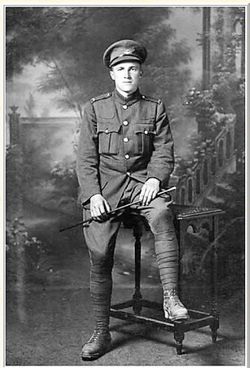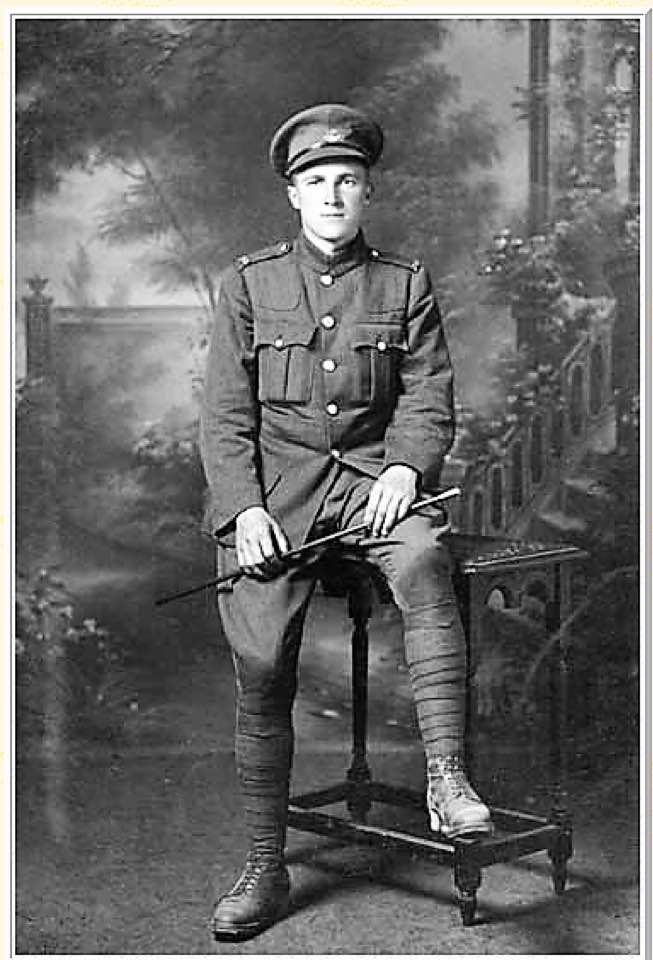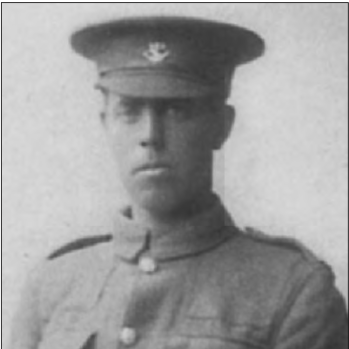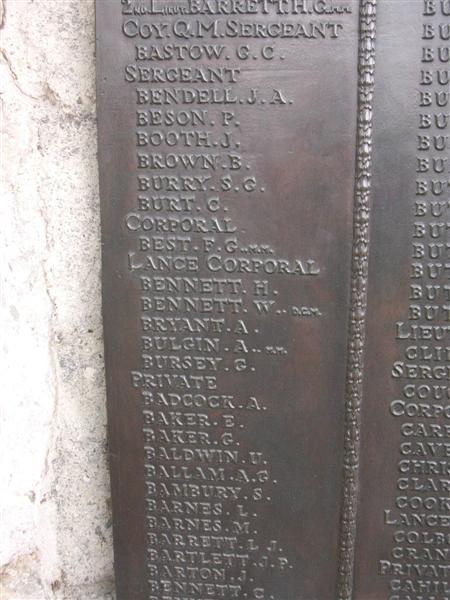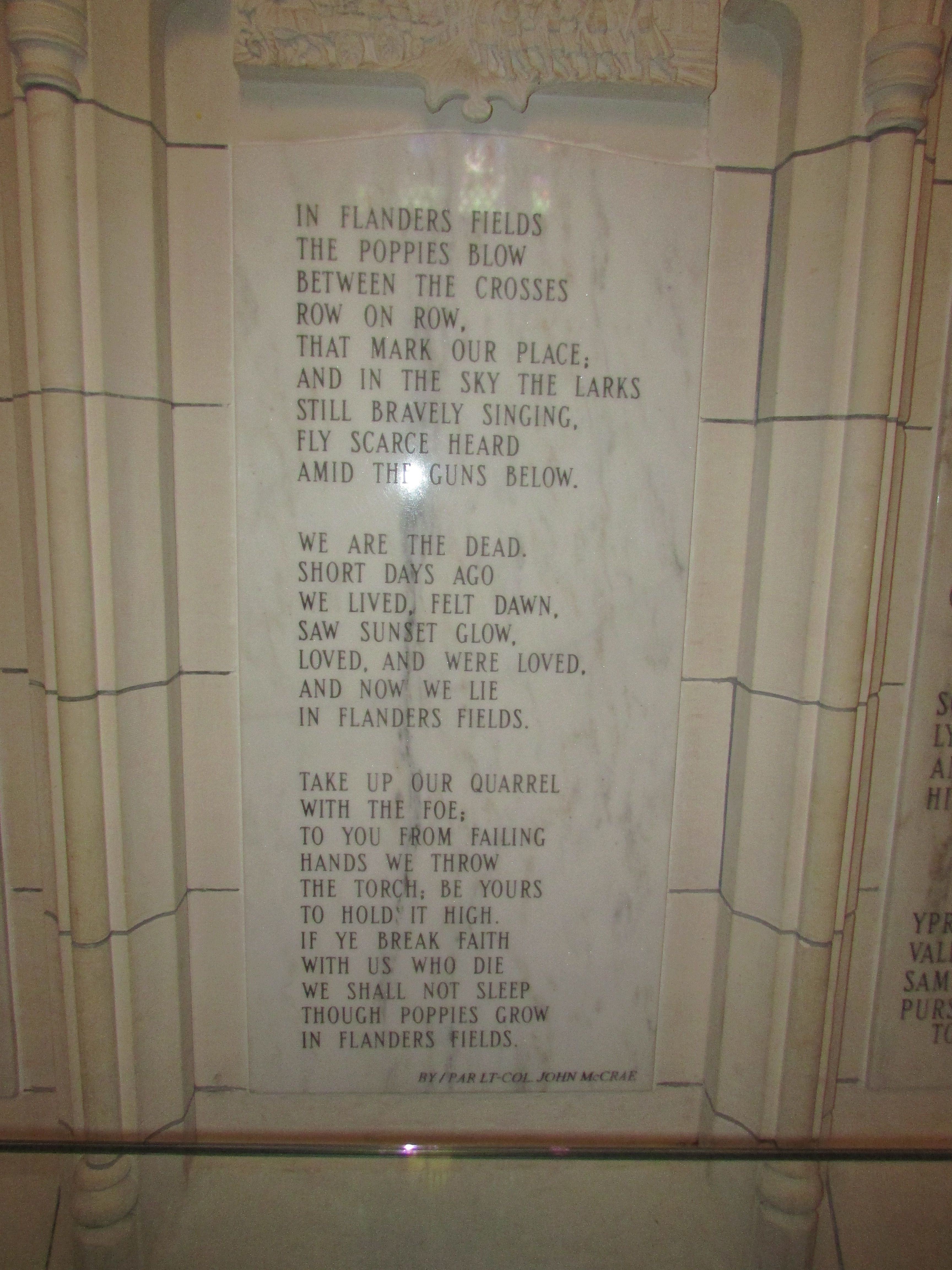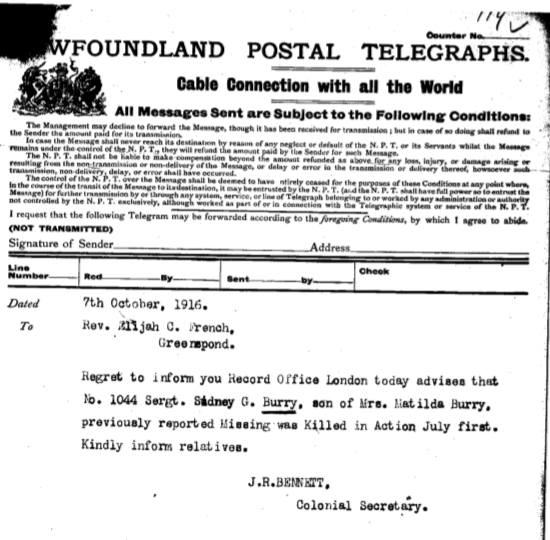Son of Job and Matilda Whitemarsh Burry of Greenspond, Newfoundland.
---------
Enlisted as a private, he was soon selected for overseas deployment on March 20th, 1915 sailing to Devonport, Great Britain; Alexandria, Egypt on August 20th, 1915, Cairo on August 31st, 1915 with his final destination being Gallipoli on September 15th, 1915 which was still part of the Ottoman Empire.
His voyage, especially for someone who had never departed the shores of Greenspond, Newfoundland, must have been quite an adventure despite the reason for having to leave his parents, Matilda and Job Burry (brother to my great grandfather Zacchaeus Burry).
Although, Sidney George Burry's war records do not mention the Battle of Gallipoli, he may have been very much part of this conflict as The Gallipoli Campaign of 1915-16, also known as the Battle of Gallipoli or the Dardanelles Campaign, was an unsuccessful attempt by the Allied Powers to control the sea route from Europe to Russia during World War I. The campaign began with a failed naval attack by British and French ships on the Dardanelles Straits in February-March 1915 and continued with a major land invasion of the Gallipoli Peninsula on April 25, involving British and French troops as well as divisions of the Australian and New Zealand Army Corps (ANZAC). Lack of sufficient intelligence and knowledge of the terrain, along with a fierce Turkish resistance, hampered the success of the invasion. By mid-October, Allied forces had suffered heavy casualties and had made little headway from their initial landing sites. Evacuation began in December 1915, and was completed early the following January.
During his travels and military training, private Sydney George Burry was promoted to Lance Corporal on April 26th, 1915 and promoted to Sergeant on February 27th, 1916. I believe these promotions may have been due to field commissions as he was seeing active military duty since his arrival to Gallipoli.
Sergeant Sidney George Burry, still with the 88th Brigade of the 29th Division, received word on February 25, 1916 that he would be part of the Somme offensive. He departed Egypt on March 14, 1916 and arrived at France eight days later. For the next three months, he readied for combat. The Newfoundland Regiment trained rigorously, did tours of duty on the front line, dug trenches, strengthened defenses, and observed the enemy. Although the battle would not begin until July 1, the months leading up to it were dangerous. The Germans often shelled Allied trenches, and snipers were another threat
The Newfoundland Regiment's assignment (along with the rest of the 88th Brigade) was to seize control of the German trenches near the village of Beaumont Hamel. The Regiment would be part of a third wave of attackers to leave Allied trenches.
The men left their trenches at 9:15 a.m., with orders to seize the first and second lines of enemy trenches. But as they moved down the exposed slope towards No Man's Land, no friendly fire covered their advance. Instead, German cross-fire cut across the advancing columns of men, killing or wounding most of them before they even reached No Man's Land.
On the first day of the Battle of the Somme, no unit suffered heavier losses than the Newfoundland Regiment, which had gone into action 801 strong. When the roll call of the unwounded was taken next day, only 68 answered their names. The final figures that revealed the virtual annihilation of the Battalion gave a grim count of 233 killed or dead of wounds, 386 wounded, and 91 missing. Every officer who went forward in the Newfoundland attack was either killed or wounded.
Sidney George Burry was initially listed as missing in action but later reported as have been killed in action on July 1st, 1916.
Posthumously, Sidney George Burry was promoted to Staff Sargent receiving the Victory Medal and British War Medal.
Matilda Burry received the final monthly allotments of 0.75 pence a month with a final amount of 31 pounds and 15 pence for the loss of her son.
Son of Job and Matilda Whitemarsh Burry of Greenspond, Newfoundland.
---------
Enlisted as a private, he was soon selected for overseas deployment on March 20th, 1915 sailing to Devonport, Great Britain; Alexandria, Egypt on August 20th, 1915, Cairo on August 31st, 1915 with his final destination being Gallipoli on September 15th, 1915 which was still part of the Ottoman Empire.
His voyage, especially for someone who had never departed the shores of Greenspond, Newfoundland, must have been quite an adventure despite the reason for having to leave his parents, Matilda and Job Burry (brother to my great grandfather Zacchaeus Burry).
Although, Sidney George Burry's war records do not mention the Battle of Gallipoli, he may have been very much part of this conflict as The Gallipoli Campaign of 1915-16, also known as the Battle of Gallipoli or the Dardanelles Campaign, was an unsuccessful attempt by the Allied Powers to control the sea route from Europe to Russia during World War I. The campaign began with a failed naval attack by British and French ships on the Dardanelles Straits in February-March 1915 and continued with a major land invasion of the Gallipoli Peninsula on April 25, involving British and French troops as well as divisions of the Australian and New Zealand Army Corps (ANZAC). Lack of sufficient intelligence and knowledge of the terrain, along with a fierce Turkish resistance, hampered the success of the invasion. By mid-October, Allied forces had suffered heavy casualties and had made little headway from their initial landing sites. Evacuation began in December 1915, and was completed early the following January.
During his travels and military training, private Sydney George Burry was promoted to Lance Corporal on April 26th, 1915 and promoted to Sergeant on February 27th, 1916. I believe these promotions may have been due to field commissions as he was seeing active military duty since his arrival to Gallipoli.
Sergeant Sidney George Burry, still with the 88th Brigade of the 29th Division, received word on February 25, 1916 that he would be part of the Somme offensive. He departed Egypt on March 14, 1916 and arrived at France eight days later. For the next three months, he readied for combat. The Newfoundland Regiment trained rigorously, did tours of duty on the front line, dug trenches, strengthened defenses, and observed the enemy. Although the battle would not begin until July 1, the months leading up to it were dangerous. The Germans often shelled Allied trenches, and snipers were another threat
The Newfoundland Regiment's assignment (along with the rest of the 88th Brigade) was to seize control of the German trenches near the village of Beaumont Hamel. The Regiment would be part of a third wave of attackers to leave Allied trenches.
The men left their trenches at 9:15 a.m., with orders to seize the first and second lines of enemy trenches. But as they moved down the exposed slope towards No Man's Land, no friendly fire covered their advance. Instead, German cross-fire cut across the advancing columns of men, killing or wounding most of them before they even reached No Man's Land.
On the first day of the Battle of the Somme, no unit suffered heavier losses than the Newfoundland Regiment, which had gone into action 801 strong. When the roll call of the unwounded was taken next day, only 68 answered their names. The final figures that revealed the virtual annihilation of the Battalion gave a grim count of 233 killed or dead of wounds, 386 wounded, and 91 missing. Every officer who went forward in the Newfoundland attack was either killed or wounded.
Sidney George Burry was initially listed as missing in action but later reported as have been killed in action on July 1st, 1916.
Posthumously, Sidney George Burry was promoted to Staff Sargent receiving the Victory Medal and British War Medal.
Matilda Burry received the final monthly allotments of 0.75 pence a month with a final amount of 31 pounds and 15 pence for the loss of her son.
Family Members
Sponsored by Ancestry
Advertisement
Advertisement
